
McCluskey meets with middle school students as part of the Big Cheese Reads initiative
Kevin McCluskey – Staying Power
Longevity is impressive for a non-profit, but it has been more important to Boston Partners in Education that the work we do is effective—that we are always providing Boston Public School students the support they need. This has meant maintaining a close relationship with BPS. While some needs in BPS have changed over the past 50 years—and we have redesigned and reformed to meet those needs—there are some things that have never changed.
Kevin McCluskey has been one of the greatest supporters of Boston Partners for over 30 years. A Boston native who attended the Paul A. Dever School as well as Boston Latin, McCluskey is a big believer in public education. “For me, it was the pathway to opening up doors, creating opportunity, and enabling us to try to reach our full potential. I am still trying to do that,” he said.
McCluskey grew up in a politically motivated family and was taught at an early age the power of community involvement. His father was a community activist and organizer, and in tandem with his mother, the pair successfully closed a local city dump after a young girl from their neighborhood was killed by a dump truck. He recalls growing up with a string of influential politicians in conversation with his parents in their living room.
After graduating from Harvard University, McCluskey ran twice for the School Committee, once in 1977, and again in 1979, narrowly losing out each time. “That was still on the tail end of the busing crisis. I told folks throughout the city that I wasn’t sure that was the best way to go about it, but I couldn’t promise them, as others were, that I was going to somehow stop it,” he said. However, he was instated to the Committee after one of its members was found guilty of extortion and removed from office.
McCluskey served from 1980 to 1987, and as the President of the School Committee in 1983. He was committed to creating partnerships between the city and the schools, and considers taking part in the creation of the Boston Compact one of his proudest achievements. “With the Compact, we were able to open the doors, say ‘we need your help,’ and then try to be as specific as possible with the business community, with the education community, and with the arts community.”
McCluskey wanted to improve schools by focusing on what took place in the classroom. So when Isabelle Besecker and Betsy Nelson of School Volunteers for Boston made a presentation to the school committee in 1980, they made a strong impression on him. “I think that the central goal and central mission has remained the same from how it was presented by Isabelle and Betsy, which was to engage well-trained volunteers and bring them into the schools where they could have a direct impact and be a support system for teachers,” he said.
While there were many forms of support for the students in BPS, he heard a lot of positive news about Boston Partners. “When you connected with principals and teachers you would very often hear that they thought very highly and appreciated the support they were getting,” he said.
Boston Partners has long understood that in order to maintain success, its role in the Boston Public Schools has to be supportive. McCluskey believes that the training of the volunteers at Boston Partners has been part of what was so helpful. “They didn’t want to become what I term as a benevolent burden. The last thing teachers need is someone else to manage. And what I heard at the time and what is certainly still consistent is that teachers and principals don’t need to manage the Boston Partners when they are in the building, McCluskey said.
On the volunteers specifically, McCluskey remarked: “There is a trust level that is there, and they know they need to help in whatever way possible, and to get down to the nitty gritty of connecting with individual students and having as much impact as possible.”
After leaving the School Committee, McCluskey became the Community Liaison for Harvard University. He quickly joined our Board and has been a stalwart supporter of Boston Partners in Education ever since, serving today as a Big Cheese Reader. He believes that students in urban education often face extremely difficult situations at school and at home that can leave them jaded unless people with positive messages and an interest in their lives can intervene.
“They need as many people delivering messages of hope and opportunity as they possibly can,” he said. That has given Boston Partners a staying power over time. “Because if you don’t have people with that kind of philanthropic mentality, then the kids at the Dever, where I went to school, and throughout the system… they’re not going to get the kind of help that they need.”
From McCluskey’s vantage point, he is able to see that many of the challenges the school system faced in the past are still present today. Yet, some of the best solutions, such as creating partnerships to specifically address issues, also remain constant. “There’s always been a need for as many helping hands, hearts, and minds as possible. That has never changed, and I don’t think it ever will change, either in Boston or any other urban system,” he said.
